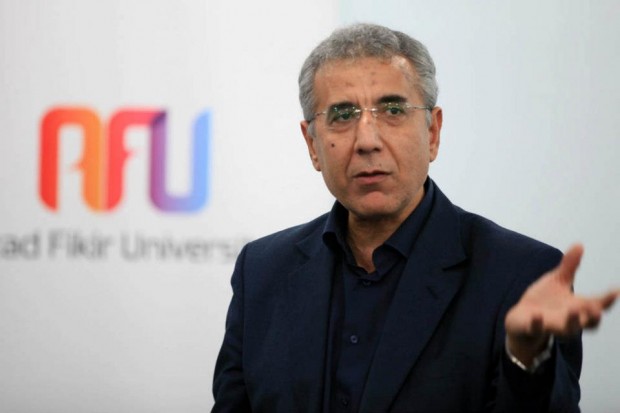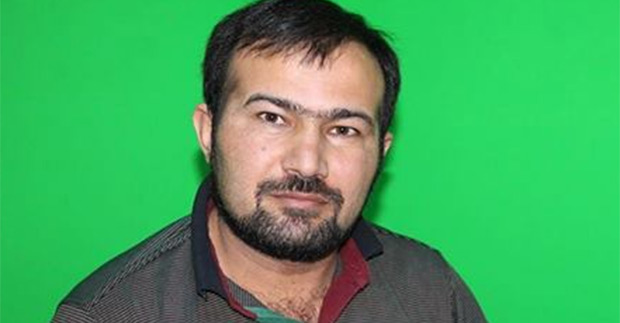24 Jun 2016 | Azerbaijan, Azerbaijan News, mobile, News and features

Rahim Haciyev, editor-in-chief of Azerbaijani newspaper Azadliq, accepts the 2014 Index Freedom of Expression Journalism Award. (Photo: Alex Brenner for Index on Censorship)
On 14 June, Qasid, an Azerbaijan’s state-owned media distributor warned that it will shut down the 2014 Index on Censorship Freedom of Expression Journalism Award-winning newspaper Azadliq by 27 June if it doesn’t pay an outstanding debt of approximately $12,000 it allegedly owes, Radio Free Europe reported.
Rahim Haciyev, acting editor-in-chief of Azadliq, told Index why it’s important to keep the paper’s journalists reporting.
Why is it important for Azadliq to continue its mission?
Rahim Haciyev: Azadliq is an independent newspaper that fights for freedom of speech in Azerbaijan. In fact, the main job of the press is to provide readers with objective information. Freedom of speech is under severe pressure from the government. We at the newspaper fight for freedom as well as provide readers with objective information. Our activity is of great importance because we are the only remaining press agency inside Azerbaijan that challenges the government.
Why is the government trying to shut down the paper?
Rahim Haciyev: Azadliq always follows the “golden rule of journalism”, which is to only serve the truth. In a country with wide-scale corruption and sharp limitations to human rights and freedom, it should not be surprising that the only newspaper that publishes articles about all of these issues is under intense pressure. It is common for authoritarian regimes to restrict the freedom of speech and expression in order to silence press outlets which provide citizens with objective information. This is what the Azerbaijani government attempts to do. The newspaper pays great attention to the problem of political prisoners and continues to do so right now. Each issue of the newspaper contains photos of political prisoners that the government would rather people forget.
How many people are still contributing to the paper’s coverage?
Rahim Haciyev: Azadliq, as a daily newspaper, is facing severe financial constraints. Our small staff of 20 journalists are working under the dual threat of government harassment and financial insecurity. We can’t hire more journalists because the state-owned news distributor, Qasid, refuses to pay the paper for sales. Right now it owes us approximately $50,000, but is demanding we pay them $12,000. At the same time, a lot of journalists don’t want to work with us because of the real personal and professional risk of being associated with an opposition newspaper.
29 Mar 2016 | Azerbaijan, Azerbaijan News, Campaigns

Index on Censorship welcomes the release of lawyer Intigam Aliyev, but says the Azerbaijan authorities must now release journalists and activists who remain imprisoned.
Aliyev is a lawyer who specialised in defending the rights of Azerbaijani citizens before the European Court of Human Rights. Index calls on the government of Ilham Aliyev, the president, to further release journalists Khadija Ismayilova, Seymur Hezi and all political prisoners who have been locked up for voicing criticism of the government.
“This release is good news for Intigam Aliyev’s family. The international community must continue to put pressure on Azerbaijan to free journalists and political prisoners that it remain in detention,” Index on Censorship CEO Jodie Ginsberg said. “Azerbaijan still has a very long road ahead in delivering basic freedoms — including a guarantee of freedom of expression for all its citizens. It must end its judicial harrassment of reporters, political opponents and others who are committed to the promotion of democracy and human rights.”
Aliyev, who ran the Azerbaijan-base Legal Research Institute, was one of a score of prominent human rights activists and journalists who were arrested and subjected to show trials in 2014 and 2015.
In April 2015, Aliyev was sentenced to 7.5 years imprisonment for illegal business activities, tax evasion and abuse of power. The case was widely condemned as being politically motivated by Azerbaijan’s government.
Aliyev’s release follows the pardoning of 14 political prisoners by a presidential decree on 17 March.
Human rights defender Rasul Jafarov, the founder of the Sport for Rights campaign, stepped out from Baku’s Prison Number 10 into freedom on 17 March after spending 593 days unjustly jailed. The same day, the European Court of Human Rights issued a judgment in Jafarov’s case, acknowledging that his arrest and detention were politically motivated.
Jafarov was one of 14 political prisoners included in the pardon decree signed on 17 March. The other political prisoners pardoned through that decree included journalists Parviz Hashimli, Hilal Mammadov, and Tofig Yagublu; human rights defenders Taleh Khasmammadov and Anar Mammadli; NIDA civic movement activists Rashadat Akhundov, Mahammad Azizov and Rashad Hasanov; bloggers Siraj Karimli and Omar Mammadov; former government official Akif Muradverdiyev; chairman of the National Statehood party Nemat Penahli; and Musavat party activist Yadigar Sadigov.
A further political prisoner, journalist Rauf Mirkadirov, was released on 17 March by the Baku Court of Appeals, which commuted his six-year prison sentence into a suspended five-year sentence. Mirkadirov had been unjustly jailed since April 2014 on politically motivated treason charges.
Award-winning investigative journalist Khadija Ismayilova, who has been detained since 5 December 2014. Ismayilova was initially arrested on charges of incitement to suicide, which Index condemned as spurious. In February 2015, Ismayilova was additionally charged with tax evasion and abuse of power. In September 2015, she was sentenced to 7.5 years after a show trial at which she declared her innocence.
Journalist Seymur Hezi was sentenced to five years imprisonment for “aggravated hooliganism” on 29 January 2015. He was arrested and detained in August 2014.
Rahim Haciyev, acting editor of Index award-winning newspaper Azadliq, told Index in September 2015 Hezi’s prosecution was due to his critical articles of the Azerbaijan authorities in the newspaper, as well as critiques he had made in his online TV programme, Azerbaijan Hour.
29 Jan 2016 | Azerbaijan, Azerbaijan News, mobile, News and features

Seymur Hezi was sentenced to five years in prison for “aggravated hooliganism” on 29 January 2015.
On the anniversary of Azerbaijani journalist Seymur Hezi’s sentencing to five years imprisonment for “aggravated hooliganism,” the country’s authorities have continued to target journalists, independent media and human rights activists.
Hezi, who contributed to the Index on Censorship Freedom of Expression Award-winning newspaper Azadliq, was sentenced on 29 January 2015. He was arrested on 29 August 2014 following an altercation in which the journalist was defending himself from a physical assault and harassment, according to his lawyers.
Rahim Haciyev, acting editor of Azadliq, told Index in September 2015 Hezi’s prosecution was due to his critical articles of the Azerbaijan authorities in the newspaper, as well as critiques he had made in his online TV programme, Azerbaijan Hour.
Haciyev said Hezi’s health is “very bad” due to the Azerbaijan’s awful prison conditions. Despite this, he said the journalist is working on articles about the country’s recent political history — some of which have been published in Azadliq.
In Hezi’s final statement given during his trial, he noted his belief in the shared struggle “with my dear friends at prison”. He also said: “It is not just a confrontation between the government and the opposition. It is the struggle between the good and the evil.”
After a year activism and journalism dedicated to free expression within the restricting country, not much positive change can be seen. Investigative journalist Khadija Ismayilova remains in jail, doing everything in her power to continue spreading the message of truth and resistance. Human rights lawyer Amal Clooney recently offered to take Ismayilova’s case to the European Court of Human Rights.
Azadliq, which was one of Azerbaijan’s only remaining independent news outlets operating inside the country, was forced to discontinue publishing a daily print edition of the newspaper in July 2014, due to its financial situation. The paper was hit with enormous fines following multiple defamation suits in 2013, and its journalists — including Hezi — have been targeted by authorities with politically motivated charges.
“The repression and detainment of journalists are continuing,” Haciyev said. “[The] government has started to arrest Facebook activists.”
Haciyev said that because the government cannot solve its country’s main problems, they try to create new problems for society through eliminating any chance of other opinions being promoted.
This article was originally posted to Index on Censorship
25 Jun 2015 | Azerbaijan, Azerbaijan News, Europe and Central Asia, News and features

Rahim Haciyev, editor of Azerbaijani newspaper Azadliq, holds up a copy at the 2014 Index awards (Photo: Alex Brenner for Index on Censorship)
Index award-winning newspaper Azadliq, widely recognised as one of the last remaining independent news outlets operating inside the country, is facing imminent closure. This comes amid an ongoing crackdown on critical journalists and human rights activists in Azerbaijan, and as the country is hosting the inaugural European Games in the capital Baku.
A statement from the paper, quoted Thursday on news site Contact, outlined its “difficult financial situation”.
“If the problems are not resolved in the shortest possible time, the publication of the newspaper will be impossible,” it read.
“The closure of an independent media outlet like Azadliq, which Azerbaijani officials have suffocated over the past two years, flies in the face of repeated assurances from President Ilham Aliyev that his government respects press freedom. The fact that this financial crisis is occurring during the Baku European Games just underlines the shameful disregard that the Azerbaijani government has for freedom of expression,” said Index on Censorship CEO Jodie Ginsberg.
Azadliq has long faced an uphill battle to stay in business. Thursday’s statement merely detailed the latest development in a serious financial crisis, brought about at the hands of Azerbaijani authorities.
In July 2014, Azadliq was forced to suspend print publication. Editor Rahim Haciyev told Index that the government-backed distributor had refused to pay out the some £52,000 it owed the paper, which meant it could not pay its printer.
The paper has also seen its finances squeezed through being banned from selling copies on tube stations and the streets of Baku, and being slapped with fines of some £52,000 following defamation suits in 2013. The paper was also evicted from its offices in 2006 and its journalists have been repeatedly targeted by authorities. Seymur Hezi, for instance, was in January sentenced to five years in prison for “aggravated hooliganism” — charges widely dismissed as trumped up and politically motivated.
Azadliq — meaning “freedom” in Azerbaijani — has appealed to the public for help to stay afloat, urging “those who defend the freedom of speech in Azerbaijan” to join in the campaign to save the paper.
This comes after the Parliamentary Assembly of the Council of Europe (PACE) condemned “the crackdown on human rights in Azerbaijan”. In a resolution adopted on Wednesday 24 June, PACE called on authorities to “put an end to systemic repression of human rights defenders, the media and those critical of the
government”.
This article was posted on 25 June, 2014 at indexoncensorship.org



